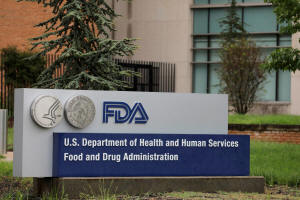U.S. FDA approves UCB's drug for rare childhood epilepsy
 Send a link to a friend
Send a link to a friend
 [March 28, 2022]
(Reuters) -Belgian biotech firm UCB
SA said on Monday the U.S. Food and Drug Administration (FDA) approved
its drug to treat seizures associated with Lennox-Gastaut Syndrome (LGS),
a rare form of childhood epilepsy. [March 28, 2022]
(Reuters) -Belgian biotech firm UCB
SA said on Monday the U.S. Food and Drug Administration (FDA) approved
its drug to treat seizures associated with Lennox-Gastaut Syndrome (LGS),
a rare form of childhood epilepsy.
The drug, branded as Fintepla, already has the U.S. approval to treat
another form of childhood-onset epilepsy, Davet Syndrome (DS), in
patients aged two years and older.
LGS causes cognitive dysfunction and frequent seizures that often lead
to injury, and UCB's Zogenix unit estimates that about 30,000 to 50,000
people have the syndrome in the United States.
The FDA approval was supported by safety and efficacy data from a Phase
3 clinical trial in 263 patients with LGS, the biotech firm said in a
statement.
Developed by Zogenix, Fintepla is available only through a restricted
drug distribution program in the United States.
California-based Zogenix was acquired by UCB in a deal worth about $2
billion, which closed earlier this month.

Bernstein analyst Wimal Kapadia forecast worldwide peak sales for
Fintepla of about $300 million by 2030 from the LGS indication alone,
and of about $800 million in total from both the indications.
Fintepla adjusts a receptor called Sigma 1, which controls how brain
cells communicate with each other. The drug comes with a boxed warning
for heart and lung conditions such as valvular heart disease and
pulmonary arterial hypertension.
[to top of second column]
|

Signage is seen outside of the Food and Drug Administration (FDA)
headquarters in White Oak, Maryland, U.S., August 29, 2020.
REUTERS/Andrew Kelly/File Photo
 The FDA approval pits Fintepla
against Jazz Pharmaceuticals' cannabis-based drug, Epidiolex, which
is U.S.-approved to treat seizures related to Dravet Syndrome and
LGS.
In a late-stage study, Fintepla showed average reduction in the
frequency of seizures by 39.4% at three months. Epidiolex showed a
44% reduction in seizure frequency over a similar period in its
study.
Fintepla's relatively higher pricing and undifferentiated data in
LGS could restrict its use to patients who have failed two prior
lines of therapy, Kapadia said.
"In the DS indication it is clear that Fintepla is a superior
product, but I think that's less true for the LGS indication."
Other drugs, which could potentially add to the competition for
Fintepla include Takeda Pharmaceutical's soticlestat and Eisai Co's
lorcaserin and Fycompa.
(Reporting by Bhanvi Satija, Manojna Maddipatla and Ann Maria Shibu
in Bengaluru; Editing by Devika Syamnath, Sherry Jacob-Phillips and
Subhranshu Sahu)
[© 2022 Thomson Reuters. All rights
reserved.] This material may not be published,
broadcast, rewritten or redistributed.
Thompson Reuters is solely responsible for this content.
 |